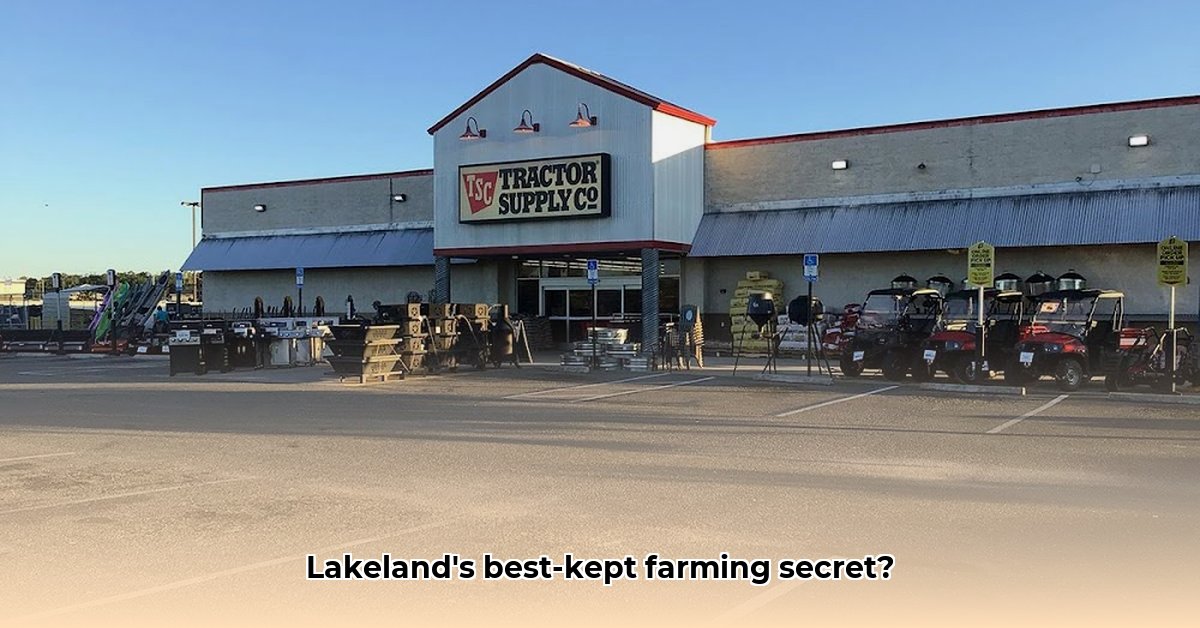
Lakeland Tractor Supply (TSC) serves as a vital resource for farmers and agricultural businesses in and around Lakeland, Florida. This case study examines its role in supporting the local agricultural community, specifically its potential contribution to sustainable farming practices. While comprehensive data is limited, we analyze its location, accessibility, and potential to foster sustainable agriculture based on available information. This analysis highlights TSC’s current impact and explores opportunities for future growth and contribution to the region. For similar examples, see this case study.
Location, Access, and Convenience: A Strategic Advantage
Strategically located on Highway 98, Lakeland TSC enjoys excellent accessibility for farmers across a wide radius, encompassing neighboring towns like Plant City and Auburndale. Its extended hours (8 am to 9 pm) cater to the demanding schedules of agricultural work, offering unparalleled convenience. This accessibility is a significant competitive advantage, facilitating crucial supply access for busy farmers. The store's prime location minimizes travel time, maximizing its usability in the community.
Supporting Sustainable Agriculture: Untapped Potential
Lakeland TSC possesses considerable potential to promote sustainable agriculture within the community. Its proximity to agricultural schools presents a unique opportunity for collaborations and educational initiatives. Imagine workshops on water conservation techniques or organic farming methods, jointly led by TSC staff and educators, creating valuable learning experiences for students and local farmers.
However, a comprehensive assessment of its impact on sustainable agriculture requires further data. Detailed inventory information is crucial to understand the range of sustainable products offered. Do they stock organic seeds, water-efficient irrigation systems, or other eco-friendly supplies? Similarly, data on customer demographics – their farming practices, purchasing habits, and needs – would offer valuable insights into the store’s existing support of sustainable agriculture and its potential for future growth. These data gaps prevent a fully comprehensive analysis at present.
Stakeholder Analysis: A Network of Interdependence
The Lakeland TSC's operations affect a variety of stakeholders, with both short-term and long-term implications.
| Stakeholders | Short-Term Impact | Long-Term Impact |
|---|---|---|
| Lakeland Tractor Supply | Increased sales; enhanced community image; potential for new partnerships. | Established market leader in sustainable agricultural supplies; increased profitability; strong brand reputation. |
| Local Farmers | Convenient access to supplies; potential exposure to sustainable farming practices. | Improved yields; reduced environmental impact; enhanced financial sustainability. |
| Local Government | Economic growth; job creation; potential for collaborative sustainability initiatives. | Stronger local economy; improved environmental outcomes; enhanced community image. |
| Environmental Organizations | Opportunity for collaborations; potential for a reduction in environmental footprint. | Enhanced environmental stewardship in the region. |
| Educational Institutions | Opportunities for collaborations; real-world educational experiences for students. | Increased awareness of sustainable farming; potential for future workforce development. |
This table highlights the interconnected nature of these relationships. A thriving Lakeland TSC benefits all stakeholders, underscoring the importance of further research to fully grasp these dynamics.
Conclusion: A Case for Further Research
This analysis, while limited by data scarcity, reveals the considerable potential of Lakeland TSC. Its strategic location and extended hours offer significant advantages, but a deeper understanding of their inventory, customer base, and engagement in sustainability initiatives is needed. Future research, including customer surveys, inventory audits, and detailed case studies, would allow for a more robust assessment of their actual impact. This would not only benefit Lakeland TSC but also offer valuable insights for other rural retailers looking to support sustainable agriculture. While Lakeland TSC exhibits promise as a potential model for other rural locations, broad generalizations from this single case study should be made cautiously. More data is essential.
Call to Action
Readers are encouraged to share their experiences with the Lakeland Tractor Supply store, providing valuable anecdotal evidence to support future research. Suggestions for improving the store’s contributions to sustainable agriculture are also welcome.